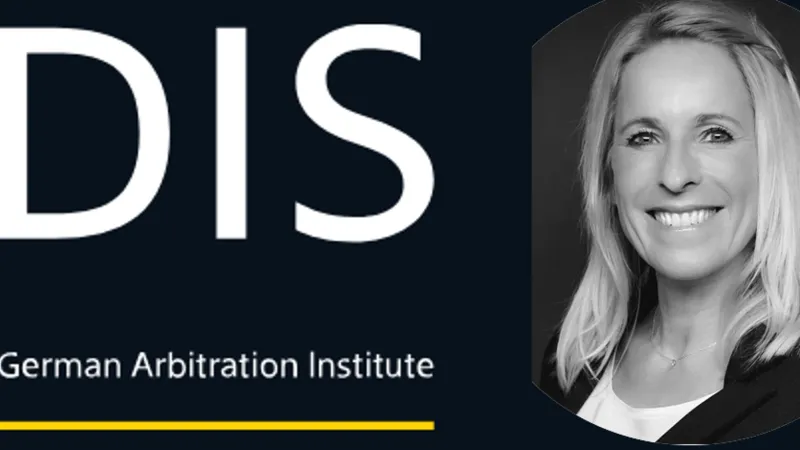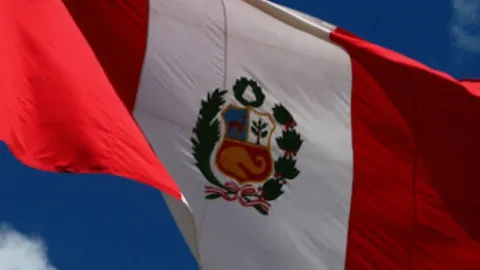Interviews with Our Editors: In Conversation with Ramona Schardt, Secretary General of the German Arbitration Institute (DIS)
September 4, 2025
On 1 January 2025, the German Institute of Arbitration (“DIS”) introduced the new DIS Sport Arbitration Rules, which are specifically tailored to the essential sport-specific features of arbitral disputes. This reform is one of the many innovations implemented by DIS in recent years, including the Supplementary Rules for Third-Party Notices introduced in 2024, and the DIS eFile, the electronic case management system, introduced in 2023. To celebrate all these changes, we have invited Dr. Ramona Schardt who has been the Secretary General of DIS since 1 January 2023.
Dr. Schardt, thank you for joining us in our Interviews series!
First of all, could you briefly introduce yourself to our readers and explain what your role at DIS entails?
Gladly. I am Ramona Schardt, Secretary General of DIS since early 2023. I have worked in dispute resolution for over 20 years – first as counsel at a major law firm in Frankfurt, and later in-house at Siemens and Siemens Energy in Munich. That background helps me understand arbitration from both the legal and the business side, and to focus on what users really need.
At DIS, I lead a dynamic and diverse team of 26 colleagues across our offices in Berlin and Bonn. I am responsible for all operational aspects of the DIS – from case management, legal operations, IT, HR, compliance, data protection to marketing, and business development. It’s a bit like being a CEO: I’m responsible for keeping everything running – and moving forward.
A key part of my role is also external: I represent the DIS in dialogue with our members, users, policymakers, and the judiciary. I speak at international events and help position the DIS as a modern, forward-looking arbitration institution. I truly enjoy doing that.
What distinguishes DIS from other arbitral institutions?
I believe there are four characteristics that differentiate DIS.
First, in addition to arbitration, we provide a globally unique portfolio of coordinated ADR rules, covering mediation, conciliation, expert determination, and adjudication. Few institutions in the world can offer that range under one roof.
Second, the DIS is not just an institution but also a registered association. We are fully independent – both from public authorities and private stakeholders – and supported by a strong community of more than 1,600 members from Germany and abroad.
Third, we are close to our users. Our governance bodies and leadership include many experienced in-house counsel, so we understand what businesses really need from modern dispute resolution.
Finally, our approach to dispute resolution is unique. According to Article 26 of the DIS Arbitration Rules, tribunals should actively promote early settlement throughout proceedings. Over 50% of our cases are resolved without the need for a final award (see Blog post here).
On 1 January 2025, the 2025 DIS Sport Arbitration Rules came into force, replacing the 2016 DIS Sport Arbitration Rules and implementing the reform of the WADA Code (World Anti-Doping Agency Code). Can you tell us about the top three key developments introduced by these new rules?
The new DIS Sport Arbitration Rules mark an important step forward – not just for us at DIS, but for the entire sports community in Germany and beyond. As the institution hosting the German Court of Arbitration for Sport, we wanted to create a modern and reliable framework. The three key developments are:
- Alignment with the 2018 DIS Arbitration Rules: We have combined our established procedural standards with sport-specific adaptations – most notably shorter time limits to reflect the fast pace of sporting events and decisions.
- Implementation of the WADA Code: The Rules fully integrate the requirements of the World Anti-Doping Code, ensuring procedural compliance with international standards and legal certainty for all involved.
- Enhanced athlete rights in arbitrator selection: In doping-related disputes, athletes now have a primary right to nominate either the sole arbitrator or the chair of the tribunal from a closed list. If NADA does not approve the athlete’s selection, the DIS Appointing Committee steps in and appoints the arbitrator.
The response so far has been very positive, and we expect a surge in sports arbitration under these new Rules as we are seeing strong interest from stakeholders in Germany and abroad. To meet this demand and ensure broader accessibility, an official English version of the Rules will be published shortly.
In March 2024, DIS was the first arbitral institution to introduce rules to contractually bind a third party to an arbitral award, known as the Supplementary Rules for Third-Party Notices (see Blog post here). How did this development come about and what are the practical implications that our readers should keep in mind?
Our Supplementary Rules for Third-Party Notices – or DIS-TPNR – are a true innovation in the field of arbitration. The DIS working group was established in 2021 to address a longstanding gap: the so-called recourse trap, where a party held liable in arbitration cannot effectively recover from a responsible third party because that third party is not bound by the award. This issue frequently arises and has also been flagged in the Queen Mary Arbitration Survey as a key limitation of arbitration.
The practitioners should note that: (i) the DIS-TPNR is contract-based, so both the main and third-party contracts must refer to the DIS-TPNR (the DIS offers a model clause); (ii) a party can issue a third-party notice before the tribunal is constituted; (iii) third parties may join as interveners (in support of one side) or stay out, but even if they do not join, they may still be bound by the outcome.
The practical takeaway for practitioners is clear: thoughtful contract drafting makes all the difference, and the DIS-TPNR makes arbitration a more comprehensive and integrated dispute resolution mechanism.
2023 was almost a record year for DIS and, in September 2023, DIS introduced the so-called “DIS eFile”, an electronic case management system that facilitates faster and more efficient case handling. Could you please explain its key features and how they have made it easier to manage cases?
Yes, 2023 was indeed a milestone year for, not only in terms of case numbers, but also in terms of how we manage them. The launch of DIS eFile in September 2023 was a significant step in digitalizing arbitration.
DIS eFile is a secure, cloud-based platform that gives parties, arbitrators, and the DIS shared access to a digital case file. All key documents – pleadings, exhibits, procedural correspondence – are stored in one central location and instantly available to authorized users. What really sets it apart is how intuitive and user-friendly it is, even for those without technical experience. A clear folder structure, an integrated calendar, and a dashboard view help users stay on top of things at every stage. This saves time, reduces administrative effort, and streamlines communication – especially in complex or multi-party cases.
In 2024, DIS formalised cooperation agreements with the Club Español e Iberoamericano del Arbitraje (“CEIA”), the International Arbitration Center of Madrid (“CIAM”), the Indian Council of Arbitration (“ICA”) and China International Economic and Trade Arbitration Commission (“CIETAC”). How do these collaborations strengthen DIS’s presence locally and globally?
These Memoranda of Cooperation are not just symbolic. They provide a concrete framework for collaboration: This includes joint conferences, training formats and practitioner exchange connecting arbitration professionals across Europe, Latin America, and Asia. The aim is to promote the development of international commercial arbitration and mediation and foster stronger ties between our communities.
But signing these agreements is only the beginning – we want to live these partnerships. This involves actively creating opportunities for dialogue, launching joint initiatives, and sharing visibility, so that users and practitioners alike can benefit from stronger networks and better access to high-quality arbitration services.
In short, these collaborations position the DIS not only as Germany’s leading arbitration institution, but also as an engaged, trusted partner on the global stage.
The DIS and DIS40 have also jointly worked on the German Arbitration Digest (“GAD”), which includes a freely-accessible summary of German arbitration case law in English. Could you please elaborate on this synergy and the rationale underlying this initiative?
GAD provides concise, high-quality English summaries of key German arbitration-related court decisions. Our goal is clear: to open access to well-reasoned and current decisions for the international arbitration community where such case law would otherwise remain out of reach.
The initiative is unique. It closes a transparency gap by offering rare insight into the reasoning of German courts in arbitration matters. What makes it even more special is that it is driven by the younger generation of arbitration practitioners – a great example of collaboration between DIS and DIS40.
The GAD initiative also led to the partnership between DIS and CLOUT (Case Law on UNCITRAL Texts) database. Recently, the first publication of German case was published on CLOUT in all official UN languages. How was this specific case selected? And, more broadly, what is the basis for the selection of cases that are published on the CLOUT? Is the parties’ prior agreement to this publication required?
The first GAD case was a decision of the German Federal Court of Justice from 11 July 2024. It was an ideal fit: recently published, legally significant, and highly relevant to the interpretation of the UNCITRAL Model Law. The Court addressed a novel procedural question: whether the absence of the third arbitrator’s signature on an award could be replaced by the note “signature could not be obtained.” This made the case both timely and valuable for the global arbitration community (see Blog post here).
More broadly, cases are selected based on their relevance to the interpretation and application of UNCITRAL texts, especially the Model Law and the New York Convention. The goal is to provide guidance on how national courts apply these instruments in practice.
Importantly, prior party consent is not required for publication in CLOUT. Cases are taken from publicly available sources and anonymized by the courts themselves. In most instances, we do not know the parties’ identities nor would we seek to identify them.
There were ongoing works concerning the draft bill to modernise arbitration law in Germany, but ultimately the work on the reform bill came to a halt (see also Blog post here). How was DIS involved in these reform discussions? What changes would you personally like to see in the revised German arbitration law?
The DIS was actively involved in the reform discussions aimed at modernising German arbitration law. We submitted detailed comments on both the Ministry of Justice’s key issues paper (April 2023) and the draft bill (February 2024). We also hosted online events and surveys to ensure the reform would reflect practical needs and user experience.
While the legislative process is temporarily on hold, the DIS stands ready to actively support a thoughtful and well-balanced reform as soon as the initiative moves forward.
I personally welcome a reform of German AGB (standard terms and condition) law, which – by applying even in B2B contexts – often discourages parties from choosing German law in the first place. Two recent developments are encouraging.
First, the German government has announced plans to reform AGB law, although the initial proposals would only benefit very large companies. Second, the Federal Court of Justice (BGH) issued a decision on 9 January 2025 (I ZB 48/24), that sends a strong signal in favour of party autonomy. The BGH confirmed that an arbitration clause remains valid even where the parties agreed to exclude the AGB regime under German law – including when the clause appears in standard terms. While the ruling did not directly settle the issue, the court’s obiter suggests that such exclusions are acceptable unless they violate public policy.
Finally, there have been a lot of talk about diversity and inclusion in the arbitration community (see Blog posts here). In 2024, almost 44 % of arbitrators appointed by DIS were women, compared to 13.33 % a decade ago. What other goals do you hope to achieve in the future to make DIS as inclusive as possible?
Diversity and inclusion remain core priorities for the DIS. We have just reached an important milestone: as of June 2025, 61.54% of arbitrators appointed by the DIS were women. That is a significant increase from 44.44% in 2024 and exceeds our previous record of 53.85% in 2023. I am truly encouraged by this development – it shows that institutional appointments are moving meaningfully towards more balanced representation.
This progress reflects our team’s continued commitment to advancing diversity in arbitration. One key initiative is our DIS Arbitrator Database, which allows arbitrators to register and express interest in future appointments. While not exhaustive, it expands the pool of qualified candidates and helps us identify diverse profiles across gender, geography, language skills, and legal backgrounds.
However, the gender gap in party appointments remains striking: as of June 2025, only 16% of arbitrators appointed by parties in DIS proceedings were women. That is a clear call to action. We encourage counsel and in-house lawyers to actively consider gender diversity when selecting arbitrators.
Dr. Schardt, thank you for your time and your valuable perspectives!
This interview is part of Kluwer Arbitration Blog’s “Interviews with Our Editors” series. Past interviews are available here.
You may also like











